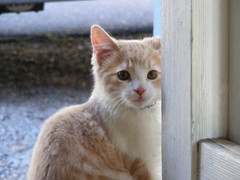Cats and humans can suffer from some of the same allergies. These days, more and more owners are turning to natural treatments for allergies in their cats.
An allergy is the result of an overreaction by the feline immune system to a substance eaten, inhaled or simply encountered in the environment. For an allergy to occur, the cat must be exposed to the culprit at least two times.
There are two kinds of reactions. Hives and itching are the usual symptoms of immediate exposure. Delayed reactions can cause itching days after exposure.
Common Cat Allergies
Four types of allergies are the most common:
Inhalants.Cats are often allergic to foreign particles in the air. The most common offenders are trees, weeds, grass, mold, mildew and dust mites. In most climates, pollen allergies occur only in the spring and summer. Typical signs include head and neck itching, a rash on the neck and back, skin eruptions and hair loss from overzealous licking or grooming
Fleas.The presence of fleas causes an immediate immune response. However, the cat might still be itching days after flea removal.
Foods.Food allergies are usually acquired. The biggest causes are products with beef, pork, chicken or turkey. Possible symptoms include itching, digestive disturbances and respiratory issues. Sometimes the eyes and/or ears are involved.
Contact reactions.They usually cause minor skin irritation and scratching. Causes are substances found in an object the cat uses, such as a bed or a flea collar.
Traditional Treatments
The type of traditional treatment appropriate depends on the kind of allergy the cat has and the duration of exposure. The most common include:
- Steroids
- Desensitization immunizations
- Medicated shampoos
- Immunosuppressant drugs
Steroids and immunosuppressants can cause significant side effects because they reprogram the immune system. Desensitization is expensive, takes up to two years and is successful in just half the cats treated.
Natural Treatments
A natural cat allergy treatmentis often less costly, more convenient and likely to produce fewer side effects. Many owners have had good results with:
- Avoidance of the offending substance
- Hypoallergenic foods with meats like duck or venison
- Omega-3 fatty acids
- Biotin
Before using any treatment, remember to always get your veterinarian’s recommendations.
